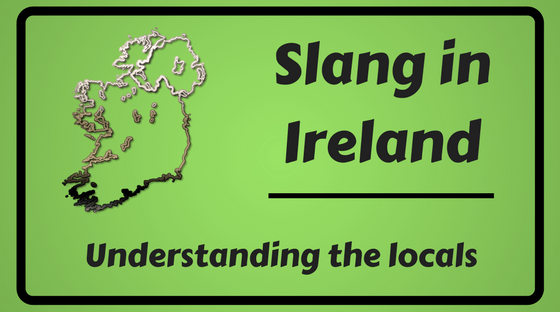The English language teaching industry in Ireland is worth millions, attracting students from all over world. To the international ear our spoken English is apparently very clear and easy to understand.
However, among our own tribe we speak a coded form of slang and use unique phrases full of different meanings indecipherable to outsiders. This post on Irish slang is a crash course in 25 of the common phrases Irish people use and say.
COMMON PHRASES
- How’re things/What’s the story/How’s she cuttin’: This will be the first question you’re asked in Ireland. It simply means how are you?
- Grand: The universal answer to number 1. Grand can mean anything from dire straits to complete nirvana. Grand will tell you nothing about the other person other than their desire to move swiftly on to a topic other than their well-being.

- Not too bad: Irish people have a habit of stating the positive in the negative. Awesome is the US version of not too bad.
- Getting/Doing the Messages: Grocery shopping.
- Look at the cut of him: Ah yes, the negative judgement us Irish dispense so freely and so frequently. Look at the mess of him is the translation here.
- He’s cute out: Even such a positive word like cute is used in the negative in Ireland. Cunning is the translation for cute in this instance. Cute is a word associated with my own county…and not in the positive sense.
- He’s quare out: He’s difficult, challenging, problematic. Quare and cute are a lethal combination.
- Acting the maggot: Being silly or problematic.
- The ESB is out: ESB stands for Electricity Supply Board and it’s the company that has been generating electricity in the Republic of Ireland since the 1920s. If your ESB is out then you have a power cut.
- Did you turn off the Immersion?: Hell and damnation awaits you if you answer in the negative. However, if the ESB is out you may have the opportunity to atone for your sin. An Immersion is a non-timed electrical water heater which Irish plumbers have a fixation for installing. It only requires brief activation (30 minutes) but uses a large amount of ESB. Choosing an alternative to an Immersion is heresy.

- What kind of a yoke is that? The question you’ll get asked if you install any water heating system other than an Immersion. A yoke is a non-complimentary name for a thing. A yoke is not to be confused with a yolk which is the yellow, nutrient-rich part of an egg.
- She’s having notions about herself: Translated as She’s trying to be something she’s not or is the practice of acquiring a superiority complex. Someone who drinks skinny soy lattes and uses pink Himalayan salt in their salad could be deemed to be having notions. Until such time an activity or a yoke becomes common practice its practitioner is having notions.
- Well that bate Banagher!: Used as an exclamation of surprise, I’m not quite sure of this phrase’s origin but it’s often followed up with the phrase And Banagher bate the devil. Bate is the colloquial term for beat.
- It’s banjaxed: Translated as It’s broken. Can be used in a variety of contexts to signify a problem.
- Making a bags of it: Making a mess of something.
- Yera go ‘way: Or as they say in the US, are you kidding me?
- John is doing a line with Mary: In urban Ireland, John and Mary may well be engaging in the use of illicit substances. In rural Ireland, John and Mary are simply dating.
- The height of blaguarding: A phrase which denotes a strong sense of annoyance. The verb blaguarding means wrong-doing and a blaguard is a wrong-doer. It was the height of blaguarding to raise taxes to bail out the banks is a perfect example of the phrase’s use as well as succinctly explaining Ireland’s recent financial recession.
- I’ve no meas in that: Meas, pronounced like mass, is the Irish word for interest.
- There’s no grá for him there: Grá, pronounced like graw, is the Irish word for love. Someone’s all out of love in this instance. Grá can be used in a similar context as meas.
- What carried you there?: The question I get asked when returning from an edgy or perceivably challenging destination. Why did you go there is its translation.
- Now we’re sucking diesel: Like Banagher, I don’t know the origin of this Irish slang phrase but it signifies success and an ability to progress after a challenge.

- There was a fierce rí rá going on there: Pronounced phonetically as ree-raw, it refers to chaos and trouble.
- I don’t know what ráiméis he was going on with: Translated as I don’t know what nonsense he was talking about. Ráiméis is the Irish word for nonsense and is pronounced raw-maysh. It’s commonly used, possibly reflecting the prevalence of ráiméis in Ireland.
- It was cat altogether: This is a phrase used to describe a negative situation. The weather during the summer of 2008, which inspired my trip to Biarritz, was said to have been cat altogether (i.e. very wet).

IRISH SLANG: SUMMARY
If you have any meas in visiting Ireland I hope this list will be highly informative for you. Perhaps this blog post is complete ráiméis but what carried you here in the first place? To be honest, these phrases only work with an Irish accent so don’t attempt to speak them if you are not so equipped.
Also, different counties have their own unique phrases so the above list is a general guide. But if you have gone to the trouble of learning all the phrases off by heart then you’re well and truly sucking diesel!
My Planning a Trip to Ireland post contains further information on navigating this crazy country!
Author’s Note: This post was originally published on 1st January 2018.


Great article! and very educational. I have been twice in Ireland and as English is my second language, I struggle a little.
LikeLike
Thanks Paula. Glad you like found this of benefit.
LikeLike
These will be good to know if I ever get to reschedule my trip to Ireland I was supposed to take last year.
LikeLike
It’s a pity that your trip to Ireland was cancelled. At least you will be fluent in the local lingo when you arrive. Thanks for the feedback.
LikeLike
I’ve been to Ireland a few times and since my family is British I knew a few of the slangs already which was helpful! There are a lot of slangs to wrap your head around though.
LikeLike
Yes, we twist the English language into our unique lingo! Thanks for the feedback, Krista.
LikeLike
These are so fun! I love learning all the sayings in different countries.
LikeLike
Thanks for the feedback. Irish people look at this list and feel as if they’re listening to an echo!
LikeLike
LOL – I love this. I moved to New Zealand 17 years ago and was so confused by the slang but my British friends said much of it was the same there. I am surprised to see how different it is in Ireland. This was a really fun read.
LikeLike
Thanks for the feedback, Rhonda. I guess every English-speaking country puts their own slant on the language.
LikeLike
Great post, thanks! I love Ireland and can’t wait to return. I’ve pinned this article so I can read up again before my next trip.
LikeLike
Great to hear. People will be surprised that you’ll be so knowledgeable on their secret language!
LikeLike
I love these! Most of these terms I’ve never heard of but it’s helpful to learn before visiting Ireland. Crossing fingers I’m visiting next year! It’s funny that I use the term “not too bad” all the time and I’m American. Maybe I have Irish roots?! 😁
LikeLike
Thanks Vanessa. Best of luck with your trip to Ireland.
LikeLike
This list made me laugh. Thanks for sharing. I’ve been to Ireland several times and I have not heard most of these yet. Good to know.
LikeLike
Thanks Nora. Maybe we don’t use these phrases in the presence of tourists? I’ll monitor accordingly going forward!
LikeLike
My two favs are ” Acting the maggot” and “Now we’re sucking diesel”. I think I will have to incorporate them into my vocab now!!
LikeLike
Thanks Tiffany. Delighted to see I’ve converted you!
LikeLike
This is so much fun! 😆😆 My favourite has got to be “It was cat altogether”!
LikeLike
Thanks Shafinah. We have some classic phrases alright!
LikeLike